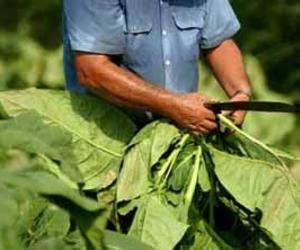Cuban tobacco farms 'show other side of cigar trade'
- Submitted by: lena campos
- Business and Economy
- 11 / 22 / 2013

Cuban cigars are the country's most lucrative export, but tobacco farmers are often shortchanged in the government-controlled industry.
From its climate to its nightlife Cuba has become a popular tourist hotspot with close to 3 million visitors annually. But despite all the tourist attention, Cuba is probably best known for what it exports - cigars.
Canadian photographer David Wile spent some time travelling through Cuba with his girlfriend and visited some of the tobacco farms near the rural town of Vinales.
Vinales is located south-west of the capital Havana and is an area well suited to growing tobacco.
"It's very picturesque," Says Wile. "It's a little different landscape from a lot of Cuba."
"This is like their sort of farming, sort of agricultural hub of Cuba."
Cuba produces more than 80 million cigars each year - bringing in more than $440 million AUD in revenue. But with the government controlling all of Cuba's tobacco industry many of the farmers don't see the benefits.
"Most of the tobacco that’s farmed - actually it's all the governments property," says Wile. "So they don't really reap the rewards of the sales from their tobacco - they just make a set wage."
"Their average salary is not much... probably 10 to 25 American dollars a month."
"They don't make a lot of money on paper, or a lot of profits from the jobs that they're working. But they do have a lot of government benefits. So whether that's a good thing or a bad thing I don't know."
Cuba is home to more than 11 million people - with all the citizens given access to government services such as a national health and education system.
By many standards people in Cuba and even the tobacco farmers are well off - but when individual Cuban cigars can sell for almost $70 AUD (£40) on the streets of London, someone is clearly making a lot of profit.
"You'd like to think that it goes to the citizens, to help pay for their healthcare, and to help pay for their school and their education and what not," says Wile. "But then again we do live in a world of corruption."
The farmers in Vinales don't have modern machinery - everything is done by hand using old farming techniques. While this may be a product of their poverty, Wile says it helps give them an authenticity that you don't often find in a modern economy.
"The farmers, wear really cool, old, almost it looks like army clothing," says Wile. "It looks like something that like, Che Guevara would wear with his... army guys travelling around sort of 50 years ago overthrowing the government."
"You feel like you're really photographing someone authentic, that's not part of the modern world. That isn't you know, part of like the consumerist, you know, generic sort of fashions of capitalism."
Source: SBS.com.au
Comments